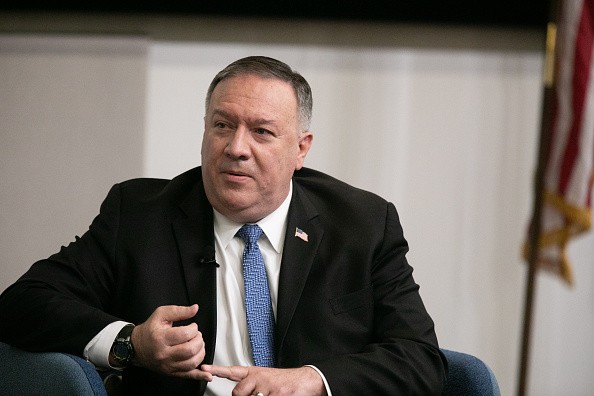
China announced fresh sanctions on 28 U.S. individuals on Wednesday, targeting Mike Pompeo with current and outgoing administration members.
In a statement on Wednesday, the Foreign Ministry in Beijing "decided to sanction 28 persons who have seriously violated China's sovereignty and who have been mainly responsible for such U.S. moves on China-related issues".
READ: Stimulus Bill Includes $25 Billion in Rental Assistance. Are You Qualified? Here's How to Apply
The list includes Peter K. Navarro, Mr. Trump's trade advisor, who was a key figure behind many of China's trade movements; Robert C. O'Brien, the outgoing National Security Adviser; David Stilwell, Assistant Secretary of State for the Office of East Asian and Pacific Affairs, who is the region's top diplomat; and Matthew Pottinger, the recently resigned Deputy National Security Adviser, Anoth The list also included former NSA John R. Bolton and former White House strategist chief Stephen K. Bannon. All of them fell out while in the office with Mr. Trump.
The sanctions bar the entry into mainland China, Hong Kong, and Macao of such persons and their immediate family members. They are also prohibited, as are any companies or organizations affiliated with them, from doing business with China.
The declaration of the sanctions coincided with President Joe Biden's inauguration, as the Trump administration was coming to an end. The timing left the Trump administration unable to issue its sanctions against Chinese officials in retaliation.
The announcement came as China and the United States clashed over the Trump administration, accusing China on its last day of committing "genocide" and "crimes against humanity" against its Uighur Muslim minority in Xinjiang. It is accompanied by a series of recent steps that have taken China's relations to a low level, with both sides clashing over Taiwan, Hong Kong and sanctions against Chinese companies.
The step comes only one day after Pompeo released a forceful statement accusing China of committing genocide in its Xinjiang region against Muslim Uighurs and other minority groups. Many Chinese officials were sanctioned in July by the U.S. That was one of several instances of sanctions taken from Pompeo, visa bans, and trade limits imposed in the Trump administration's final year on Chinese leaders and Communist Party officials.
ALSO READ: Tearful Pelosi: Congress Members Who Were Accomplices to Capitol Siege May Be Prosecuted
Under the previous administration, relations between the U.S. and China deteriorated considerably, taking an unusually aggressive approach. As NPR's John Ruwitch has written, Pompeo and other officials referred to China as representing America's greatest threat.
Chinese foreign ministry spokesperson Hua Chunying told the daily ministry briefing in response to the Xinjiang allegations: "Pompeo has made so many lies in recent years, and this is just another bold-faced lie."
Due to Pompeo's statement, Chunying said, "This U.S. politician is notorious for lying and cheating, is making himself a laughingstock and also a clown."
Hua said China was hoping "the new administration will work together with China in the spirit of mutual respect, properly handle differences and conduct more win-win cooperation in more sectors."
"We hope the new U.S. administration can have their own reasonable and cool-minded judgment on Xinjiang issues, among other issues."
Mr. Biden also characterized what China was doing in Xinjiang during the election campaign, where about a million people were sent to "re-education" centers, as "genocide." The U.S. declaration is likely to suggest a continuation of sanctions, including a ban on imports from Xinjiang of cotton and tomatoes and appointments of Chinese officials perceived to be active in the Xinjiang program.








